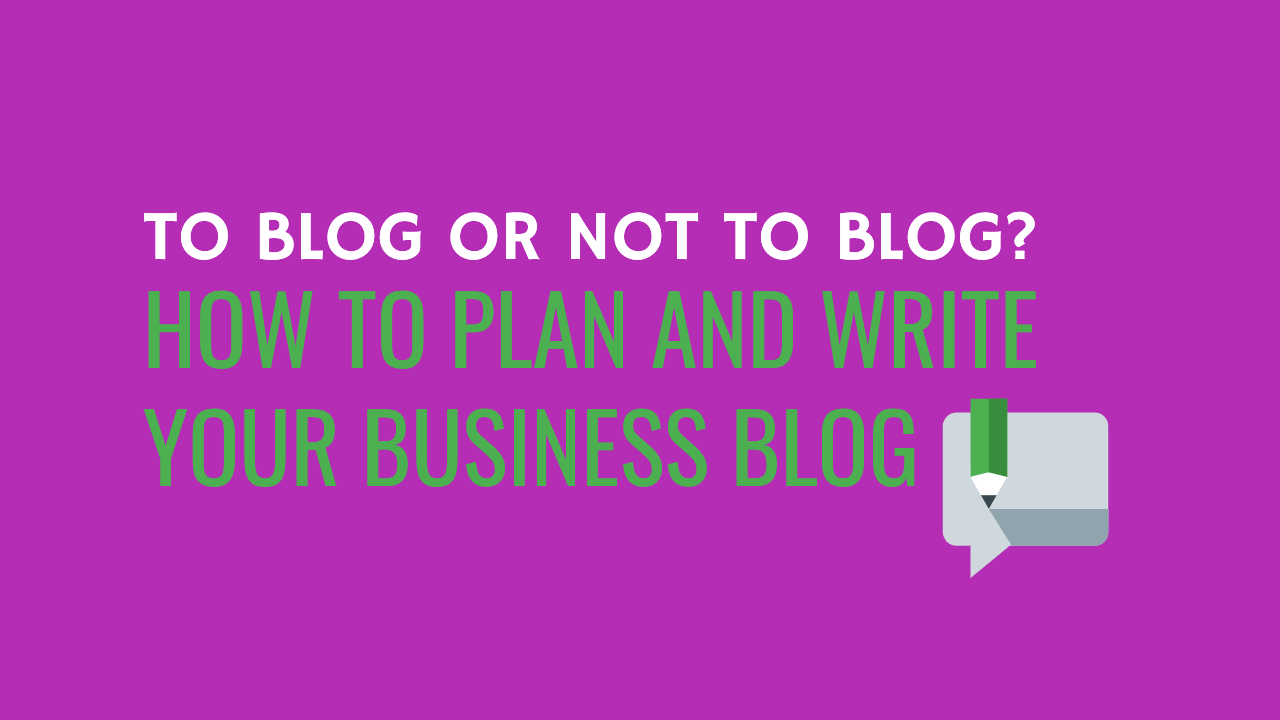To blog or not to blog? How to plan and write your business blog

‘To blog’ seems to have been a marketing term which has been around for years and yet, its surprising how many businesses still don’t understand what they actually are and how they can add real value to their digital marketing strategies.
Blogging is an essential way of reaching out to your target market and should be the foundation of any social media strategy. They provide something of value before asking for anything in return.
What is a blog?
A blog (or weblog, from where the name originated) is basically an online journal, discussion or diary located on a website.
Unlike the more traditional media stories and press releases, blogs aim to engage in a more informal way, providing a more authentic form of communication.
Blogs can contain a wide range of information and data, which can also be supported with images, videos and animated GIFs.
Why should a business start a blog?
- Blogs engage with your desired audience in a more informal way, driving brand loyalty and helping readers feel that they know you, your business, and your product / service offering.
- Blogs promote your services and products, share your expertise with useful insights and information, which is relevant to your industry – enhancing your credibility.
- Blogs present a personal, empathetic face of your business. Often, communication from organisations can be perceived as too corporate and formal. A blog however, can be written in a variety of styles, depending on the nature and purpose of your services and how this affects your target audience.
- Blogs are LOVED by the major search engines such as Google and Bing, especially when you provide relevant, up-to-date, informative content - whilst driving valuable, unique traffic to your website.
What should I blog about?
This is often the most challenging aspect of blogging – what do I actually write about? Begin with your target audience, what type of information do they want to consume i.e. short, straight-to-the-point posts or long, deep and informative articles – maybe a mix of both... AND, how will your blog Engage, Educate and Promote.
- They must engage with your target audience, regardless of whether they are aware of your business or not. They must stimulate interest in your brand and encourage a desire to want to read and experience more.
- They must serve to educate your target audience on your products and services – make sure you’re providing value based on how you provide solutions to their pain points; what differentiates you from your competitors; and why they should ultimately buy from you!
- They must provide the opportunity to promote your expertise and knowledge as well as the benefits and features of your products and services to encourage them to purchase from you.
How often should I blog?
This is a difficult question to answer as it really depends on your business and target audience. HubSpot suggests:
The frequency of blog posts depends on what's best for your company. Smaller businesses have found comfort and success posting one to four times a week, while larger companies can push out daily and, sometimes, multiple daily posts.
They continue with this useful chart:
 Copyright HubSpot
Copyright HubSpot
In need of some inspiration?
Here are my top 10 content ideas for you to blog about:
- Top tips / how to guide
- Share an experience / true story
- Interview with a customer
- Interview with an expert
- Frequently asked questions
- Product review
- Upcoming events
- Look at competitors blogs
- Look at industry blogs
- Research using www.quora.com
How should I structure my blog post?
There’s no hard and fast rule when writing a blog post, but this approach below usually works for me:
- Subject – when deciding what to write about there’s a number of factors to consider:
- Is it contemporary / relevant to your business sector or area of expertise?
- Does it inform, educate and engage?
- Is it based on a current issue / problem within your industry?
- Do you have enough supporting research / information to support your arguments if required?
- Headline – is it engaging, drawing the reader in to want to read more? Consider asking a question or starting with a statement.
- First paragraph – very important - this is the ‘make or break’ moment. Setting the scene and creating interest and desire to read more.
- Main body – Keep paragraphs short and engaging - consider using sub headings, quotes, images and tweet captions to break up the page. This is your chance to share your expertise and reflect your personality in a friendly, yet authoritative manner.
- Final paragraph – concludes / sums up your blog post. Relate it to the first paragraph – have you achieved what you outlined in paragraph 1?
- Quotes – if you’re quoting anyone, always include “quote marks” and reference the author / source of origin.
- Hyperlinks – are there any specific words or phrases you can link back to another blog or page on your website. You may also link it to another blog.
Over to you...
Hopefully I've provided enough information and encouragement for you to write your blogs. They are still one of the most effective marketing tools to promote your brand and grow fresh leads. However, if you're still struggling, have a look at some of your competitors blogs or industry blogs for further insight.
